Divided states of America poised for historic election
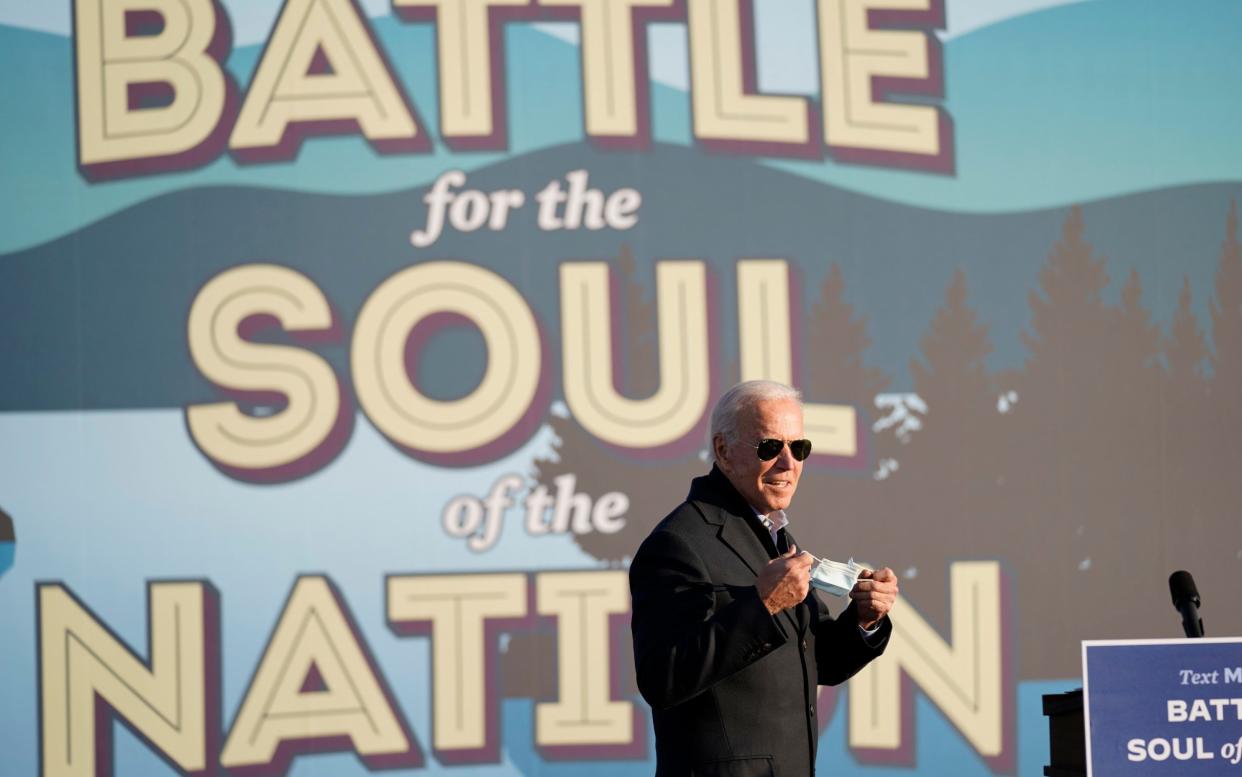
When Ed McGinty pitched his Biden sign up outside his clapboard home in The Villages retirement complex in Florida, he worried what his Republican neighbours might say.
Never before had he thought twice about displaying his allegiance to the Democrats, but the political climate was different.
First came the snide comments, then one day the lawn sign went missing. Now he no longer speaks to people he had long counted as friends. “It was clear that we couldn’t be civil knowing the other was voting for a man we detested,” he told me.
I met Mr McGinty earlier this month while out reporting on the US election for this paper. His story was by no means unique. Everywhere I went, from Illinois to South Carolina, Texas to Wisconsin, people had tales of marriage breakdowns, sibling fallouts and estrangements from friends.
As America goes to the polls on Tuesday in one of the most important elections in its history, the country has never felt more polarised.
“Today, once again, we are a house divided,” Democratic nominee Joe Biden declared at an address in Gettysburg, Pennsylvania, near the Civil War battlefield that serves as a symbol of a country split against itself. He was alluding, not too subtly, to the state of the nation under President Donald Trump.
My arrival in the US earlier this year came at a time of great turmoil for this country - two weeks before the coronavirus pandemic sent it into lockdown and two months before it erupted in protest at the police killing of black man George Floyd in Minneapolis.
Rather than uniting people, the confluence of the once-in-a-generation events only seemed to push them further apart.
The most scientifically and technologically advanced country in the world was caught woefully unprepared when Covid-19 hit in March. For the first few weeks of the outbreak it struggled to provide even the basics to frontline workers, while tests were rationed to the very sickest.
New York, where I live, was among the earliest affected. The number of casualties quickly overwhelmed the city’s hospitals and morgues.
The rest of the country had an early warning, but chose not to heed it. Part of the problem was Mr Trump treated it as a crisis of the Democrat states. “If you take the blue states out we’re at a level that I don’t think anybody in the world would be at," he once said as he tried to talk down the rising case numbers.
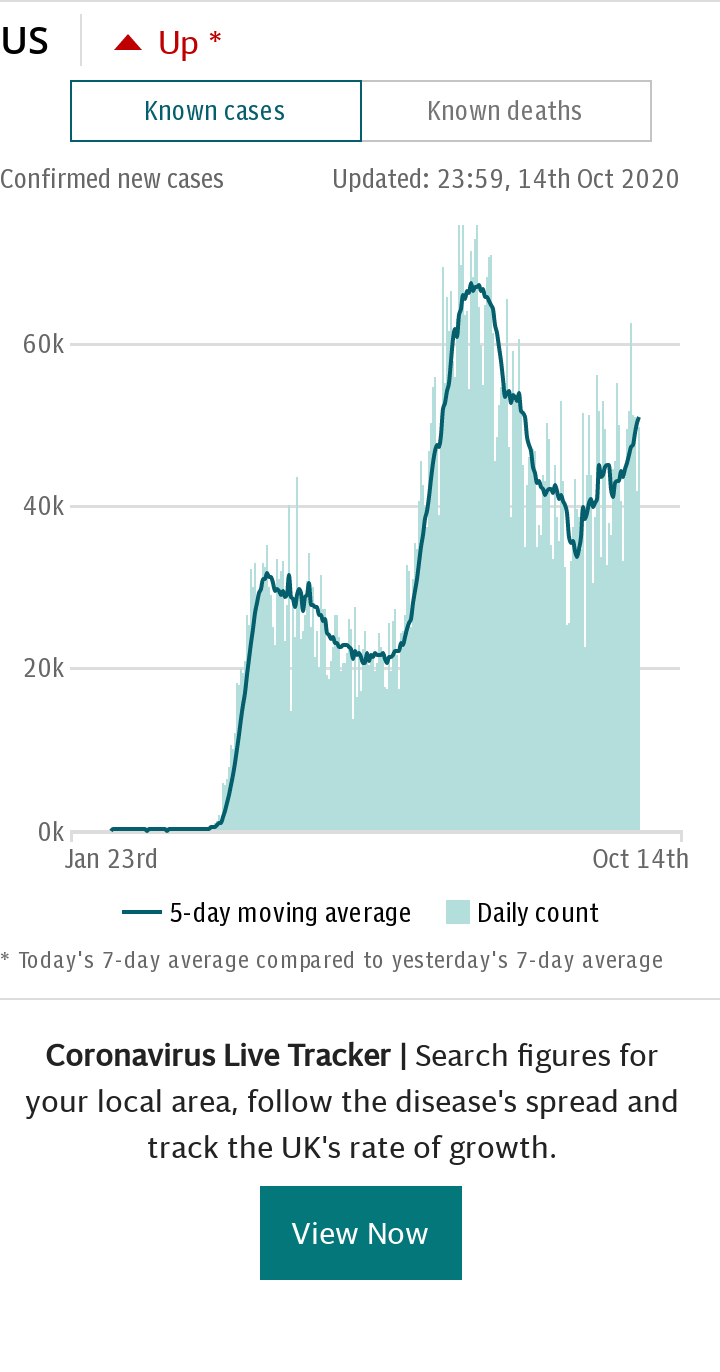
But the virus soon hit the red states too and with very little measures put in place to mitigate the spread, tens of thousands were dead within weeks. Mr Trump sidelined the scientists and held daily briefings at the White House, telling viewers it would “go away soon”.
“I honestly thought it was something that wouldn’t come here, because Houston is so different to New York,” 67-year-old Texan Harry Rodriquez told me back in June. Not long after, the Lone Star State’s daily cases shot up above New York’s and Mr Rodriquez lost his mother to the virus.
The pandemic has disproportionately impacted minorities in America, who have caught the virus - and died from it - in much greater numbers.
The rising death toll in their communities, coupled with a summer of well-documented police shootings, sparked what would become the biggest wave of civil rights protests in living memory.
I was in Houston, the most ethnically diverse city in the country, for Mr Floyd’s funeral. I came across election volunteers sitting outside encouraging people to register to vote. I asked one of them why what happened to the Houstonian had galvanised people in a way the deaths of all the other black men hadn’t.
“With the coronavirus everyone was still, just sat in their homes watching the video of that senseless killing,” Chastity Caesar said. “You couldn’t look away, and when you can’t look away it forces you to do something.”
At the height of the demonstrations, more than 15 million were out on the streets calling for an end to racial inequality. And according to polls, they had the support of the majority of the country.
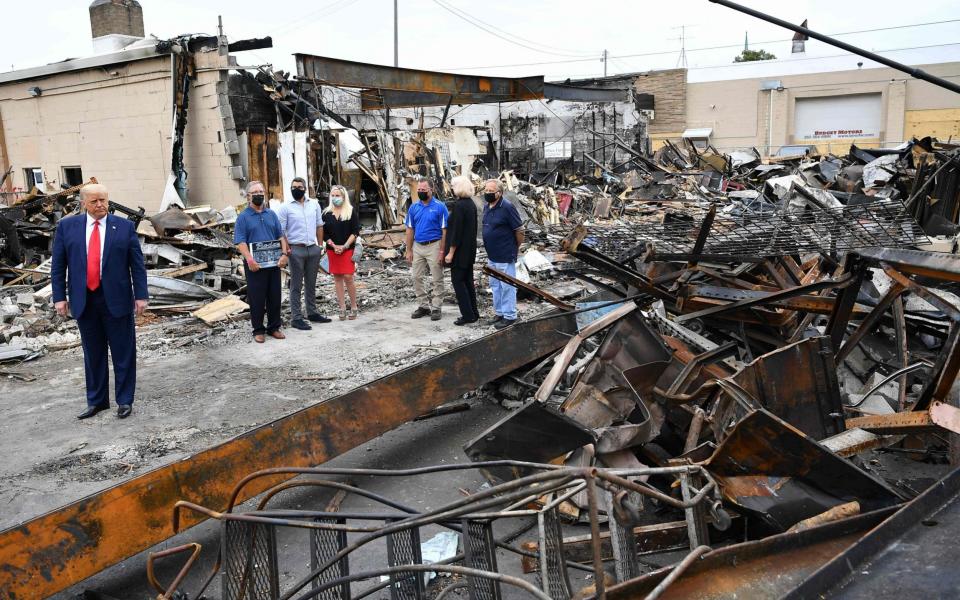
It seemed as though Mr Trump, who labelled the Black Lives Matter protesters “terrorists” and “traitors”, may have misjudged the public mood. His approval ratings dropped after the incident at Lafayette Square, when he ordered security forces to teargas crowds outside the White House for a photo op at a nearby church.
After the virus, race is set to be the defining issue of the election. And an energised black electorate will no doubt boost Mr Biden, who has knelt in solidarity with protesters calling for justice. Black voters rescued the former vice president’s sinking campaign in the primaries with a critical victory in South Carolina.
There are still many black voters, particularly younger ones, however, who wonder if Mr Biden will - or even can - do more for them than his old boss, Barack Obama. Many told me that after eight years under the first black president their lot didn’t change much.
The irony of Mr Obama’s presidency was that he was elected on the mandate of hope and change. And while he managed to pass legislation on affordable healthcare and justice reform, the poverty rate for African Americans worsened over his two terms. Income inequality between black and white, meanwhile, was at its widest point in 25 years when he left office.
Cathy Cohen, a professor of political science at the University of Chicago, summed up this attitude in a recent podcast: “They’ve seen the election of black mayors, they’ve seen the election of the first black president, and they’ve also seen that their lives have not changed.”
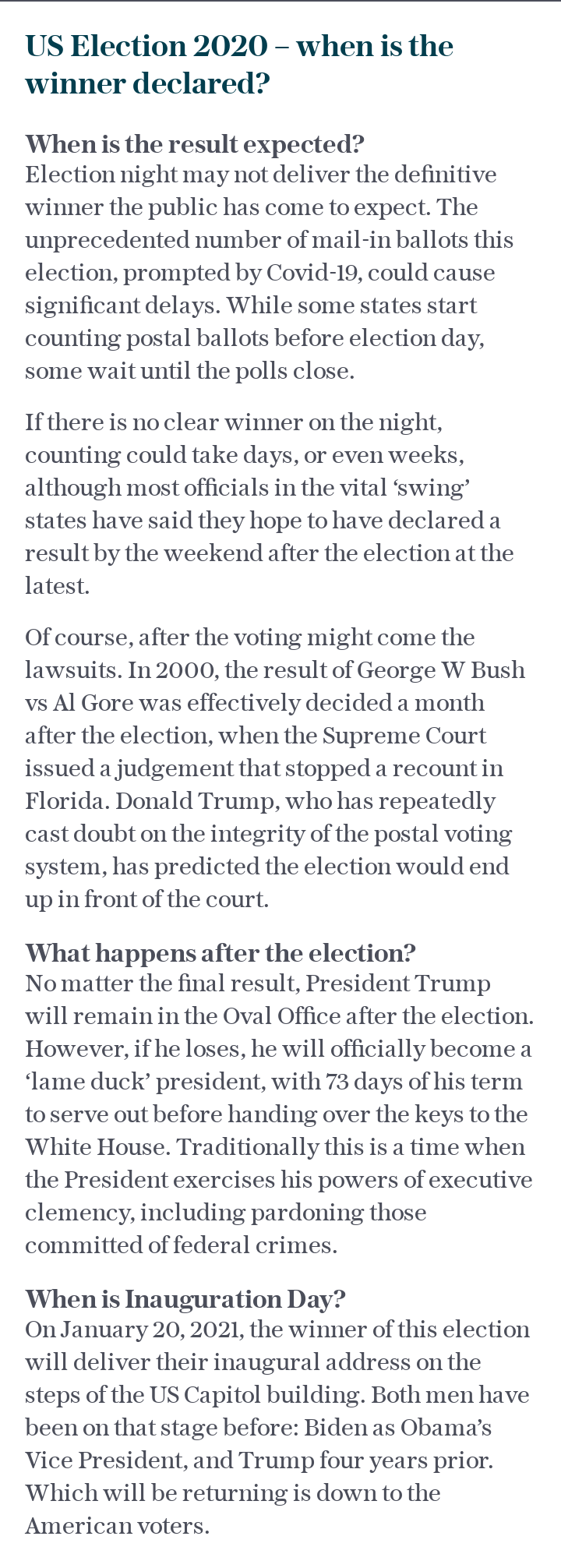
This week I spoke to black residents of the city of Kenosha in the Rust Belt swing state of Wisconsin, which was hit by violent riots after the shooting of unarmed African American Jacob Blake. Many said they were voting Democrat - not because they were particularly enthused by an ageing Mr Biden but because they feared the alternative.
Mr Trump has repeatedly claimed to be the best president for black people since Abraham Lincoln. Surveys taken among voters of colour suggest not many agree, at least not among older ones anyway. However, another showed that more than a third of 18-to-30-year-old black adults agreed that although they were not always in favour of his policies, they liked the president's “strong demeanour and defiance of the establishment".
One of the most interesting parts of covering this election for me has been meeting the people who propelled Mr Trump to the White House. As a dual national by virtue of my mother, whose family left Long Island for the UK when she was just 13, I have a connection to this country, but never fully understood it.
“If you come out for Trump at this point you’re one of four things: a racist, a bigot, a greedy SOB, or just plain stupid,” Mr McGinty from The Villages, a former Independent turned Democrat, told me of Trump voters.
Undeniably, the president has the support of white nationalists like the tiki torch-wielding, Nazi-saluting lot in Charlottesville (the ones Mr Biden says convinced him to run), but over 61 million voted for him in 2016, including my Florida-dwelling cousins.
Trump voters come in all forms, from the second-generation Yemeni Uber driver who told me in a cab ride home from La Guardia airport that the president was the sort of strongman the world needed to put Middle Eastern dictators in their place; to the third generation Italian-American family who live next door to me in Brooklyn - self-described former Democrat-voting unionists who “didn’t like the way Obama ran things”.
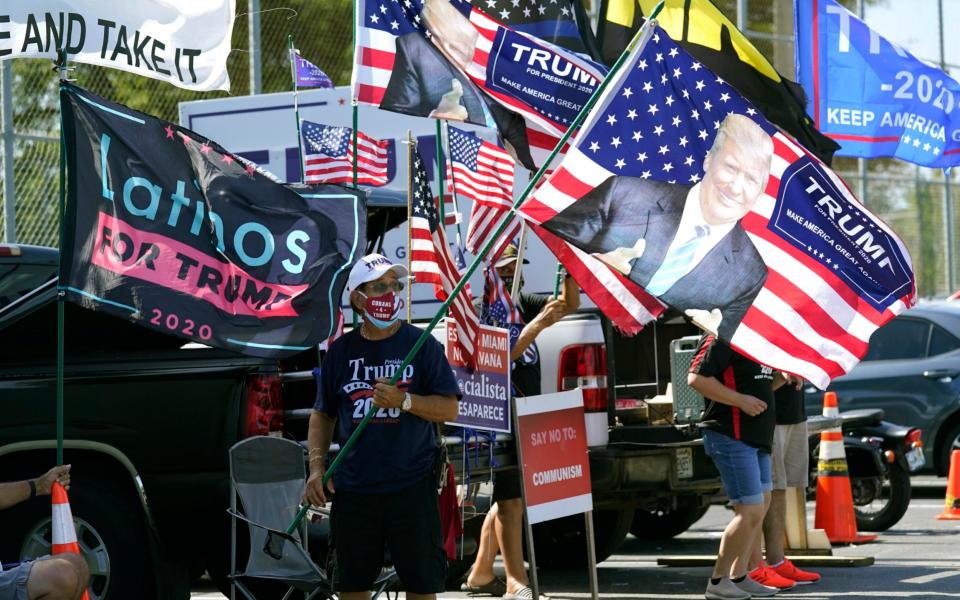
Then there was the father from Orlando who beamed when he told me why he was voting for the president again: his earnings were up and his taxes down. He had quit his job as a corrections officer and set up his own small boat-making business three years ago with the help of a loan, which enabled him to spend more time with his wife and three girls.
There was the pro-life mother-of-four in South Carolina who worried what direction the more liberal elements of the Democratic Party would take the country. And the coal miner from a forgotten part of Pennsylvania who couldn’t see a future for himself under a party that wants to move away from the only industry that has put food on his table.
Mr Trump’s brand of populism has helped him amass a dedicated, almost cultish, base. He’s idolised like a demi-god and gossiped about like a pop star.
I sit in diners wherever I go, trying to eavesdrop on conversations. “Did you see what Trump did last night?” I heard a woman ask her husband over breakfast before she proceeded to take out her phone and play a YouTube clip of him dancing.
Adoration seemed to reach fever pitch after Mr Trump was diagnosed with the virus in early October. “I will die for him, I will die for that man happily,” one supporter was heard shouting at the president’s motorcade as it passed a crowd outside Walter Reed medical hospital.
I tried to think of another world leader that elicits that kind of reaction in their people, outside of dictatorships in North Korea and Syria. Brazil’s Jair Bolsanaro perhaps? You can’t quite imagine the same level of enthusiasm being mustered for former prime ministers David Cameron or Theresa May in any case.
The most common answer to the question of why they voted for the president is variations on wanting to “drain the swamp”. In 2016 the establishment candidate was Hillary Clinton, this year it is Mr Biden. Both of whom inexorably linked to Washington, which for many has become a byword for sleaze and corruption.
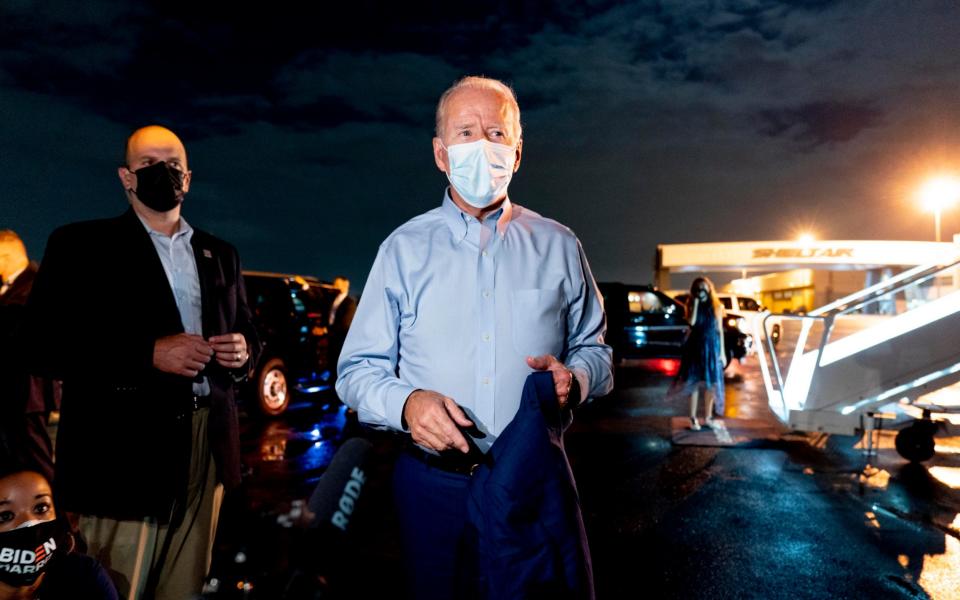
Mr Biden has a likeability that Mrs Clinton lacked, however. Outside of New York and California, it is seemingly impossible to find anyone with a good word to say about the former Secretary of State. Ask a Republican what they think of Mr Biden and they’d rather complain to you about Kamala Harris, his black running mate.
The scandals involving Mr Biden’s son, Hunter, don’t seem to have landed in the way that the Benghazi fiasco or emailgate did for Mrs Clinton.
The 77-year-old nominee has positioned himself as an antidote to Mr Trump. His closing pitch has been a plea for unity. "This is our opportunity to leave the dark angry politics of the past four years behind us,” he said.
“I believe it's time to unite the country, to come together as a nation."
No longer the blue states and the red states, but the united states.
Something I have wondered with the polls closer than many believe they ought to be after the year Mr Trump has had, is whether the president could have comfortably won the election if he had been dealt a better hand.
It’s quite possible, one pollster told me. The president received some of his highest approval ratings before the coronavirus hit. At 49 per cent, he was up there with former presidents George W. Bush and Barack Obama at the end of their first terms. Unemployment was down and the economy was booming.
But that has all since changed. Covid-19 has plunged the US into the worst economic crisis since the Great Depression. More than 20 million lost their jobs. There’s no telling how many more lives will be lost before there is a vaccine.
When voters go to the polls they will ask themselves ‘am I better off than I was four years ago?’, as they do every election. Of those I’ve posed this question to over the last few months, eight out of 10 answered no. One of the two who answered yes worked for a life insurance company.
Fearing defeat, Mr Trump has worked to undermine Americans’ faith in an election system that has served the country well for decades.
Until 2020, both the Republican and Democratic parties supported postal voting, according to Michael Barber, a political scientist at Brigham Young University in Provo, Utah. “Now this issue has become really, really partisan,” he said.
So far the number of mailed ballots cast by registered Democrats outnumbers the number cast by Republicans almost 2-1.
“I walked two miles to come here and vote in-person,” one Jamaican-born woman in her mid-50s told me in a long line outside the old library in downtown Charleston, South Carolina, last week. “That’s the only way you can be sure it will count.” She had never voted early before and had never worried about mailing in a ballot until this year.
It’s possible that Mr Trump’s alarmism has had the opposite effect than intended, mobilising Democrats in a way we’ve never seen before. In Georgia, New York, Wisconsin, Virginia, and states all over the US, lines have formed around car parks and libraries - some for miles.
Rent asunder by a summer of racial unrest, a raging pandemic, and a political system under threat, Americans have been forced into a dramatic rethinking of their exceptionalism.
How that will translate at the ballot box, we’ll soon find out.


